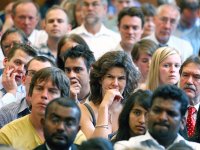Teacher Collaboration: When Belief Systems Collide
Check out these six, educational ideologies that influence a teacher’s decision-making. Which one represents you?
It's impossible to explore how we can work more effectively together in schools without considering conflict -- an inevitable part of working together. Conflict can be challenging and destructive, or it can lead to a deeper understanding between people, and perhaps higher quality work from a team.
There are many reasons why conflict can exist within a school or a team of educators. In December, I attended a fantastic workshop at the annual Learning Forward conference on breaking through conflict. It was led by Robert Garmston (co-author of Unlocking Group Potential to Improve Schools) and Jennifer Abrams (author of Having Hard Conversations). In this workshop, the presenters offered one way of identifying where conflict originates -- in the belief systems that we each hold about the role and purpose of education. What's most problematic, says Garmston and Abrams, is when we are working from different belief systems but haven't articulated them as such, and therefore don't understand why others do what they do. These undercurrents of conflict can exist between an administration and a teaching staff and between many groups within our world of schools.
6 Belief Systems
In his book, Cognitive Coaching, Robert Garmston (with co-author Arthur Costa) identifies six predominant ideologies that influence educators' decision-making:
- Religious Orthodoxy: This ideology aims to teach the habits and values that will lead to that religion's realization of how life ought to be lived in accordance with that faith. Educators driven by religious orthodoxy strive to help students learn appropriate norms and morality and to conduct their lives according to these norms.
- Cognitive Process: Educators who are primarily aligned to this stance believe that the central role of schools is to help students learn to think, reason, and problem solve. Cognitive processors select instructional strategies that involve problem solving and inquiry.
- Self-Actualization: Those who believe in self-actualization believe that the purpose of teaching is to bring out the unique qualities, potentials, and creativity in each child. They value student choice and self-directed learning and are keen to provide for students' unique and multiple needs, interests, and developmental tasks.
- Technologist: Technologists place strong emphasis on accountability, test scores, learning specific sub-skills, and measurable learning. They might be "driven by data," and frequently use terms such as accountability, time on task, mastery, diagnosis, and prescription. This is an ideology which as been adopted by many policy-making bodies in recent decades and is associated with external assessments, high-stakes testing, and teacher performance.
- Academic Rationalism: Academic rationalists believe that knowledgeable adults have the wisdom and experience to know what's best for students. They often deliver teacher-centered instruction, are drawn to the Classics, and use instructional strategies such as lectures, memorization, demonstration, and drill. They evaluate students through summative exams and content mastery.
- Social Reconstructionism: Social reconstructionists believe that the purpose of education is to help students become good citizens who can help take care of the world. They view learners as social beings who ought to be concerned with social, political, and environmental issues. They believe that education is an instrument of change and that schools are an institution charged with the responsibility of bringing about a better future and world.
You, Your Principal, and Your Colleagues
After reading these descriptions, go back and rank them according to your personal priorities and belief systems. Now imagine doing this activity with a group of colleagues. What do you think the results might be at your school? What stance do you think your principal holds? What do you suspect is the impact of working with people who hold different stances?
Click to download the PDF of this worksheet. (52.97 KB)
Credit: Elena AguilarAs you read these, you might have noticed how some of the conflict and tension we experience in public schools is a result of these conflicting belief systems. For example, if you are driven to be a teacher because of a belief in promoting the self-actualization of each individual child, you might feel in conflict, at times, with a principal -- or education policy -- that operates from a technologist ideology. Or perhaps you realized that you highly value cognitive processing, and yet, you often make decisions about instruction that seem more aligned to academic rationalism.
Let me be clear about one thing -- it's not "bad" for a staff to hold different ideological positions. In fact, it can benefit a school staff to hold diverse perspectives. It's just that when we're not clear about where we're all coming from, or which beliefs are determining our decision-making, conflict can arise.
I offer these descriptors to you in the hopes that they'll spur some conversations and reflection. Maybe these definitions of beliefs don't even resonate. Then I hope that this compels you to consider and define what you believe is the purpose of education -- and to also ask others that question. And, also, maybe ask that question of your students.
